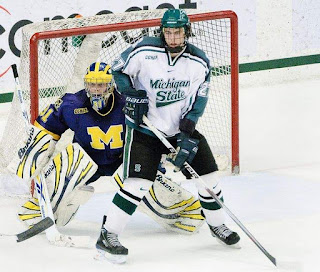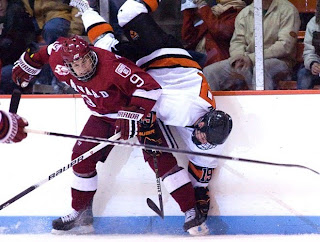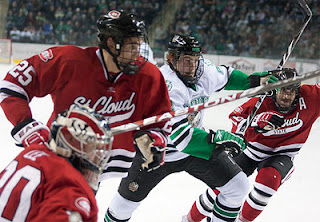
Well, I finally got my wish.
Boston College finally played the University of Alaska Fairbanks in men’s ice hockey in this year’s NCAA Northeast Regional in Worcester, Mass. I was there to see it , and I could not have been happier - or more conflicted. I graduated from BC in 1991, and then spent the 1991-92 season working in sports information with the hockey program at UAF (I still can’t bring myself to simply call it “Alaska”.)
It’s not the first time something like this has happened to me in college hockey or the NCAA Tournament. I was the hockey sports information director at Michigan State University from 1994 to 1996, and was on proverbial pins and needles three springs ago when the Spartans edged BC in St. Louis for the national title. I felt somewhat good for the many friends I’d made at State, as they could celebrate a national championship for the first time since 1986. As an alumnus, though, I was devastated by the Eagles’ loss, just one year after coming up similarly short in the title game at Wisconsin.
I’ve kind of convinced myself since that 2007 game that BC and MSU are two of the perennial powers in Division I hockey (yes, I know the Spartans have not qualified for the NCAAs since 2008) and will likely knock heads every so often at the national level. I’ve even gotten used to MSU and UAF facing off, since they’re both in the CCHA.
But BC and UAF? Sometimes I thought that the Eagles and Nanooks (that’s polar bears, for the non-Inuit out there) would never meet, unless BC was invited to the Brice Alaska Goal Rush in Fairbanks one of these Octobers. USCHO’s Jayson Moy had actually predicted in a very early Bracketology back in November that UAF and BC would meet in in the first round of the NCAAs, but really, who thought that could possibly hold up throughout an entire season and into the actual selections?
Lo and behold, though, it worked out, albeit in Worcester rather than Albany. And more than 18 years after I left Logan Airport in Boston for an 18-hour journey that ended at Fairbanks International Airport, the Maroon and Gold finally met the Blue and Gold, and in the NCAA Tournament no less.
And UAF played well. Really well, as in well enough to win and make battle-tested BC 0-3 all-time in the national tournament against teams from the 49th State - and I’ve attended all three of those games. My interest in the Great White North was originally piqued when visiting Alaska Anchorage swept the Eagles in a best-of-three NCAA first-round series in March 1991, back when the first two rounds of the tournament were still played on campus sites.
Five months later I was in Fairbanks, more than 4,000 miles from home, and nearly two decades later I sometimes still can’t believe I went through with it. It’s one thing to say you’d like to visit Alaska, or take a cruise up there. Try living there for eight months, including the winter, where snow falls in October (when it’s late), the sky becomes perpetually overcast, and the temperature ultimately drops to minus-50 degrees with no wind chill.
Now consider all that when you originally hail from the East Coast. I had never been farther west in my life than Ohio to that point, and I could measure the distance on a map between Fairbanks and my hometown in New Jersey with almost an entire yard stick.
It’s a unique place, to be sure. And a special one, made even more special by some of the people I was fortunate enough to encounter. I’ve only made it back once, in January 1996 with Michigan State, but I’ve still kept in touch with a number of UAF people over the years. Facebook has helped tremendously over the past year - it also provided some friends who are former UAF players (yes, Klip, that would be you in particular) with a forum to tell me I should be wearing Blue and Gold when the Nanooks played BC.
Actually, had UAF won the 1991 NCAA Independent Tournament in Anchorage, the Nanooks would have earned an automatic berth and headed east to play at BC’s Conte Forum. Instead it was the rival Seawolves, although BC was scheduled to play at UAF in the next year or so as part of was then known as the Great Alaska Face-Off tournament in Fairbanks. For whatever reason, though, that didn’t materialize, either. And so my own personal wait extended until last week in Worcester.
This probably isn’t the best analogy, but I guess you can compare the two schools to two girls you’ve dated. The alma mater is like the girl you dated a long time ago. You’ve moved on to other things, and don’t see each other very often, but you still share a unique bond you’ve never shared with anyone else, and never will.
The second school is the girl from almost as long ago. What you had didn’t last very long, and the meetings are even less frequent; but she is also quite special, and you could never forget her.
Then those two girls finally meet - and pretty much start beating the crap out of each other. Sort of Saturday’s game in a nutshell for me.
I was sitting rinkside at the DCU Center, a place I’d never been to before, ironically between the dasher board decals that spelled out "Alaska" and "Boston College". I was situated against the glass to the left of the net defended by BC junior goaltender John Muse for two periods. All the goals were scored down the other end of the ice, but that was the net the Nanooks swarmed in the final minutes of regulation, where they got off several shots that were stopped, blocked, went wide, or struck metal. A bounce or two left or right, and the game would have been tied.
Matt Lombardi scored shorthanded for the Eagles in the opening period. Anthony Taranto answered for the Nanooks in the second stanza. Pat Mullane put BC back up by a goal early in the third. After that it went back-and-forth, with BC trying to hold on, and UAF working overtime to stave off elimination and force OT.
As a BC alumnus, the clock couldn’t count down fast enough. As someone who had worked with the Nanooks, it was oh so close. BC held on to win, with Matt Price “scoring” an empty-net insurance goal in the final seconds, and advance to the regional final; but UAF was just that close to knotting and possibly even winning an NCAA Tournament contest in its first-ever invite to the big dance.
Afterwards I got to see several people from Fairbanks whom I had not seen in a very, very long time. I hadn’t seen Bruce Cech, the one-and-only radio Voice of the Nanooks, since 2000 at Michigan State. I hadn’t seen Dean Fedorchuk, a Hobey Baker Award finalist as senior, since a 1993 series at Elmira, the last time that UAF had ventured this far east. Talking to them again, though, it was like little or no time had passed since I used to keep the shot chart on the concourse at the Carlson Center at Nanook home games that one short year I was there.
I even got to talk by cell phone to Scott Roselius, who has worn practically every hat for Nanook Hockey that you can think of, from player to rink manager to sports information director and more. He helped to get the NCAA game against BC broadcast live back in Fairbanks at UAF’s Patty Center, and talking to him I could sense his pride in the Nanooks having finally made their national debut.
I could sense that pride from everyone associated with Nanook Hockey, including Jack Townshend, a long-time Fairbanks resident whom I had never met before but who has followed the UAF program since its inception in the 1980s; and current Nanook Head Coach Dallas Ferguson, who was a sophomore defenseman on that team that played at Elmira so long ago. I was present for that series, too, as it was the closest UAF had ever come to my neck of the woods.
Until last weekend, that is. Former UAF Head Coach Guy Gadowsky was also around in Worcester, as a member of the NCAA Tournament Committee; but I get to bother him 12 to 15 times a season in covering his current school, Princeton University, for USCHO.com as an arena reporter.
I was at the Northeast Regional as a fan, however, and as one of two schools. I met BC sophomore forward Cam Atkinson that night at the hotel shared by both BC and UAF, so maybe that helped him garner a hat trick in the regional final (yeah, sure). BC ultimately won a home run derby against a gritty Yale squad the following afternoon to advance to the Frozen Four for the fourth time in the last five seasons, and I again felt the pride I have always felt when the Eagles get this far, with the hope and anticipation of possibly even greater things to come.
I also felt pride for their first-round opponent from far away, even in a defeat that could have easily been victory. The Nanooks showed the college hockey world world that they also belong, and that even greater things should come for them, too.
Go Eagles. Go Nanooks.






















